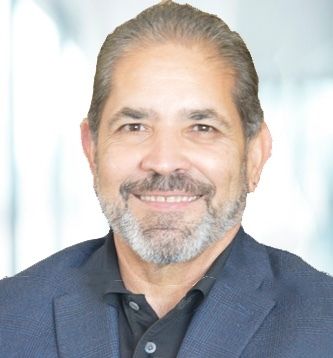Use a coaching approach to be a more effective ministry leader
This one day training event will equip you to use basic coaching principles and practices in your everyday life as well in your ministry settings. You will learn practices and approaches to evoke new awareness, clarity, and agency among the people you seek to serve. Listed below are just a few of the faculty you'll interact with before, during and after this training if you choose to be part of the online Coaching School Community. You'll also meet other staff who will share how they engage with clients and seek to be a vehicle for helping people do what matters most to them.
Meet your training team

Felix Villanueva
Director of the Coaching School, MCC

Jim LaDoux
Director of Coaching & Consulting
MESSAGE BOARD
Jim LaDoux (jladoux@vibrantfaith.org; 612.865.0628) | Schedule a Meeting with Jim (https://calendly.com/jladoux)
Our Covenant
- Attitude: Be positive, present, playful, proactive, and open-minded,
- Actions: Be on time, ready to contribute, and seek to "go first."
- Assumptions: Be willing to stretch yourself and trust the process.
Pre-Training Assignments
- Watch the Core Competencies videos to learn about the basic coaching skills.
- Consider where and when you'd apply coaching skills.
- List some of your dreams and yearnings yet to be realized.
- List areas where you may be stuck in life and ministry.
Post-Training Reflections
- List a few of your takeaways, learnings & questions.
- Identify 1-3 coaching skills you'd like to apply to your setting.
- Consider whether or not you'd like to be a certified coach.
TRAINING SESSIONS
SESSION 1 | 9:00-9:50am
What Coaching Is and Isn't
- Introduce ICF's definition of coaching.
- Explain how coaching compliments other helping professions.
- Review the 8 essential coaching core competencies.
- Review the 3 primary agreements used in coaching.
- Understand the uniqueness of coaching, consulting, counseling & mentoring.
- 4 keys for great coaching conversations (safety, process, WHAT & WHO).
- Educate your clients about your role as a coach.
- Tip 1: Trust the process
- Tip 2: Have fun; be curious
- Tip 3: Create safe space
- Tip 4: Follow the client's lead.
- Tip 5: Let go of advice-giving and "fixing."
Coaching Insights | Mark Slaughter
- What do you give/send to a client before a coaching session?
- What do you emphasize with a client about uniqueness of coaching?
- How do you prepare for creating a great coaching experience?
- What norms and expectations do you seek to co-create with a client?
- How do you evaluate and learn from a coaching experience?
SESSION 2 | 10:00-10:50am
Ask Questions that Transform
- Learn how questions increase engagement and impact.
- Use questions to clarify outcomes, scope, and sequence.
- Use questions to evoke new awareness and possibilities.
- Use questions to challenge norms and assumptions.
- Use questions to prioritize next steps.
- Use questions to build accountability and support.
- Review VFM's question library; build your "Top 20" list.
Coaching Considerations
- What do you give/send to a client before a coaching session?
- How do you prepare for creating a great coaching experience?
- What norms and expectations do you seek to co-create with a client?
- How do you evaluate and learn from a coaching experience?
- What advice would you offer about asking powerful questions?
SESSION 3 | 11:00-11:50am
Coaching Individuals, Groups and Teams
- Explain the uniqueness of coaching individuals and groups.
- Explain the difference between coaching groups and teams.
- Share 5 practices that lead to great group coaching.
Share 4 tips for managing groups; increasing engagement. - Share 3 ways for getting quick feedback from teams.
- Highlight tools that support effective coaching experiences.
- Discuss how is coaching groups is different than coaching individuals.
- Describe how is coaching teams different than coaching groups.
- Practice 1: Create a covenant to define what's needed to thrive.
- Practice 2: Interview team members individually before group starts meeting.
- Practice 3: Create space for discussing future meeting "takeaways."
- Offer 3 ways to receive instant feedback from teams.
- Tip 1: Find ways to continually engage all members.
- Tip 2: Set norms that prevent individuals from dominating.
- Tip 3: Suggest possible "pre-work" assignments.
- Tip 4: Allow the group to evaluate their progress; make course corrections.
Coaching Insights | Janny Franken
- What have you learned about coaching groups and teams well?
- What are some of the challenges coaches encounter when coaching groups?
- What do you do to keep everyone engaged in a group/team conversation?
- How do you help groups/teams celebrate their progress?
- How do you discover the unique gifts and contributions of team members?
RESOURCES | Items below may be referenced during our time together
Insights | Ideas
TIPS/TRUTHS about the coaching process
- Good questions help frame great conversations..
- Coaches follow the lead of their clients.
- Outcomes stated by the client must be owned by the client.
- Coaching is a partnership between the client and coach.
- Questions we ask clients must be for their wellbeing.
- Shorter questions are usually better questions.
- Coaches follow the lead of their clients.
- Use "say more" or "tell me more" when unsure what to say.
- Avoid the tendency to explain your questions.
- Trust the "process" and questions from the ongoing agreement.
- Evoke new awareness through rethinking assumptions, approaches, attitudes, and actions.
- Assess coaching conversations through the lens of new awareness, clarity, and agency.
COACHING EXPERIMENTS
- Listen to the types of questions people ask: List questions you ask.
- List 15+ people who could benefit from your coaching.
- List people's challenges or pain points.
- List people's self-limitations when observing their words and actions.
- Take notes at an upcoming meeting; reflect on coaching notes.
Downloadable Coaching Tools Used in this Course